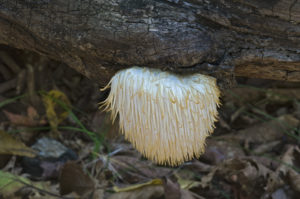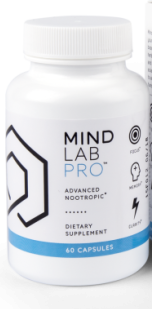Table of Contents
Lion’s Mane (Hericium erinaceus) is unique in the mushroom family both in appearance and function. Lion’s Mane Mushroom is extremely effective at stimulating Nerve Growth Factor (NGF) in the brain.
Known for its powerful effects as a “brain tonic”, Lion’s Mane is said to have been used as a tea for thousands of years by Buddhist monks. To enhance brain power, and heighten their ability to focus during meditation.
Lion’s Mane as a nootropic, is a powerful catalyst for brain cell regeneration helping improve memory and cognition.
The primary active compounds in Lion’s Mane are hericenones and erinacines. Erinacines help your brain produce more Nerve Growth Factor. Erinacines easily cross the blood-brain barrier to boost the production of neurons.
Lion’s Mane helps:
- Nerve Growth Factor. Lion’s Mane Mushroom prevents and treats nerve damage in the brain. Once past the blood-brain barrier, Lion’s Mane stimulates enzyme production that release Nerve Growth Factor (NGF). Nerve regeneration helps relieve neurodegenerative disease symptoms such as Alzheimer’s, dementia, and Parkinson’s Disease.
- Neurogenesis. Lion’s Mane stimulates the repair and creation of neurons. Boosting neurotransmitters and signaling that effects memory, learning, recall, and mood.
- Brain Optimization. Lion’s Mane helps eliminate brain fog. Restoring memory and mental alertness. And improves anxiety and depression symptoms.
Overview
Lion’s Mane (Hericium erinaceus) is a medicinal mushroom proven to benefit the brain, nerves and immune system.
Unlike other mushrooms sporting a cap and stem, Lion’s Mane has long, flowing, white tendrils. Resembling a lion’s mane. Other names include Monkey’s Head, Bearded Tooth, Pom Pom Blanc, Hedgehog Mushroom and Satyr’s Beard.

This parasitic fungus grows hanging off logs and trees. And is native to North American, Europe and Southeast Asia. In Japan, it’s called yamabushitake or “those who sleep in mountains”. Referring to the Shugendo sect of hermit monks and their long, flowing robes.
As a nootropic, Lion’s Mane has been shown to be particularly effective in stimulating Nerve Growth Factor (NGF) in the brain.
NGF is produced in the hippocampus throughout life. Modulating cholinergic receptors and neuroplasticity.[i] And is essential for learning.
Nerve Growth Factor are special proteins that function to regenerate neurons. Lion’s Mane contains two unique classes of NGF’s – hericenones and erinacines which easily cross the blood-brain barrier.
Lion’s Mane, like other medicinal mushrooms, contain high amounts of the antioxidant beta-glucoxylan and four other polysaccharides and polypeptides. Having a significant impact on enhancing your immune system. And decreasing tumor growth.
Lion’s Mane has also been studied in reducing amyloid plaques. These clumps of beta-amyloid proteins block signals between neurons. And are implicated in Alzheimer’s and other neurodegenerative diseases.
Lions’ Mane is also used to treat Lyme’s Disease, and digestive tract issues.
Here we’re talking about Lion’s Mane Mushroom and its effects on brain health and chemistry.
How does Lion’s Mane Work in the Brain?
Lion’s Mane boosts brain health and function in several ways. But two in particular stand out.
- Lion’s Mane Mushroom stimulates the synthesis of Nerve Growth Factor (NGF). NGF is a protein that plays a major role in the maintenance, survival and regeneration of neurons.
NGF is required by your brain to keep neurons strong and healthy. When various neurological disorders occur, your brain is unable to produce its own internal source of NGF.
In a study done in Kuala Lumpur in 2013, scientists showed that Lion’s Mane extract induced NGF synthesis and promoted neurite outgrowth.[ii]
- Lion’s Mane is effective in reducing anxiety and depression. Some even call it the “smart mushroom” for its ability to improve cognition, memory and work as an anti-depressant.
A study by researchers in Japan worked with 30 women. The female subjects had been complaining about menopause, depression, sleep quality and other issues.
The women randomly received Lion’s Mane-laced cookies or a placebo for 4 weeks. The researchers found that Lion’s Mane “has the possibility to reduce depression and anxiety, and these results suggest a different mechanism from NGF-enhancing action of H. erinaceus”. [iii]
How things go bad
Science once believed that the brain could not grow new brain cells. That once our brain developed during childhood, and we reached adulthood, we had all the brain cells we’d ever have.
Now we know that neurons can regenerate. But that doesn’t mean they will regenerate. A number of health issues can contribute to neurodegeneration.
↓ Decrease in Nerve Growth Factor = Decrease in Long-Term Potentiation affecting long-term memory[iv]
↓ Brain cells die and are not replaced
↓ Neuroplasticity declines resulting in poor memory
↓ Neurotransmitters decline resulting in anxiety, poor mood and depression
All of these age-related changes are contributing factors to neurodegenerative diseases like Alzheimer’s, Parkinson’s and others. And anxiety, depression and mood disorders that affect quality of life.
Lion’s Mane benefits
At least a dozen peer-reviewed studies have been published on Lion’s Mane benefits to brain health since 1991. Dr. Kawagishi of Japan was first to identify Nerve Growth Factor properties in Lion’s Mane Mushroom.[v]
In one double-blind, placebo-controlled trial, researchers in Japan worked with 50 – 80 year old men and women. All suffered from mild cognitive impairment.
The trial subjects received four 250 mg tablets containing 96% of Yamabushitake (Lion’s Mane) dry powder three times a day for 16 weeks. The men and women were tested at 4, 8, 12 and 16 weeks.
At each of the testing periods, the subjects who had used Lion’s Mane showed a significant improvement in cognitive scores. And their scores were increasing while on Lion’s Mane supplementation. But 4 weeks after stopping Lion’s mane supplementation, their cognitive scores decreased significantly.
The researchers concluded that Lion’s Mane Mushroom is effective in improving mild cognitive impairment.[vi]
How does Lion’s Mane feel?
You may not experience the effects of supplementing with Lion’s Mane Mushroom immediately. But many users report with continued use of Lion’s Mane, a boost in mood and mental energy.
 Some report it increases depth perception. And an improvement in sense of smell.
Some report it increases depth perception. And an improvement in sense of smell.
Others testify to improved decision-making, the ability to solve problems and learning. Likely due to Lion’s Mane ability to improve neuroplasticity.
The overall consensus is Lion’s Mane Mushroom’s ability to lessen anxiety, reduce depression, and improve concentration.
Lion’s Mane Clinical Research
Lion’s Mane Mushroom has been used as a food and herbal medicine since ancient times in East Asia. And it has been reported in scientific research that Lion’s Mane promotes Nerve Growth Factor both in the petri dish as well as in animal and human test subjects.
Lion’s Mane Prevents Cognitive Dysfunction
In this study, researchers examined the effects of Lion’s Mane on amyloid β(25-35) peptide-induced learning and memory deficits in mice. Amyloid β(25-35) peptide is implicated in diseases like Alzheimer’s.
Mice were injected with the peptide on days 7 and 14 of the trial. And they were fed a diet containing Lion’s Mane over 23-days of the experiment. The results showed that Lion’s Mane prevented short-term and visual recognition memory reduction normally induced by amyloid β(25-35) peptide.
They concluded that Lion’s Mane Mushroom “may be useful in the prevention of cognitive dysfunction”.[vii]
Lion’s Mane Induces Nerve Growth Factor
In this trial, mice were fed Lion’s Mane 5% freeze-dried powdered extract for 7 days. Researchers found an increase in the level of Nerve Growth Factor (NGF) in the hippocampus of the mice. Concluding that Lion’s Mane “contains active compounds that stimulate NGF synthesis”.[viii]
Lion’s Mane Repairs Nerves
In this study done with rats, Lion’s Mane extract was able to promote neuron regrowth after injury. Rats with gluteal nerve damage were able to walk again after consuming water containing Lion’s Mane extract.
The researchers concluded that Lion’s Mane regenerates damaged nerve cells. In this case, the reversal was so profound, the rats went from being totally disabled to walking again.[ix]
Lion’s Mane Dosage
Wondering how much Lion’s Mane to take? Dosing of Lion’s Mane Mushroom depends on the strength of the extract.
For Lion’s Mane 10:1 extract (30% polysaccharide), daily dosage is 500 – 1,000 mg taken 1 to 3 times per day. This means that if you choose a daily dose of 1,000 mg of Lion’s Mane extract, you should take 500 mg in the morning, and another 500 mg at noon.
Other retail extract dosage of Lion’s Mane ranges from 300 mg to 3000 mg dosed 1 – 3 times per day. Check the label and see what the manufacturer recommends. And when first using the supplement, start with the lowest dose and see how your body reacts.
Lion’s Mane Side Effects
Lion’s Mane Mushroom is non-toxic and considered very safe. So there are very few side effects reported.
Some neurohackers report itchy skin from higher doses. Likely attributable to a boost in Nerve Growth Factor.
Lion’s Mane has been tested in animals showing no side effects or toxicity even up to 5 grams per kilogram.
Best type of Lion’s Mane to buy
Lion’s Mane Mushroom (Hericium erinaceus) as a nootropic supplement is usually offered as an extract. In powdered form, or in a capsule.
 Lion’s Mane Mushroom can be found in some of higher quality pre-formulated nootropic stacks. For example, Click for Mind Lab Pro® contains 11 brain enhancing nootropic compounds including Lion’s Mane with the full fruit spectrum including hericenones and erinacines.
Lion’s Mane Mushroom can be found in some of higher quality pre-formulated nootropic stacks. For example, Click for Mind Lab Pro® contains 11 brain enhancing nootropic compounds including Lion’s Mane with the full fruit spectrum including hericenones and erinacines.
I recommend Mind Lab Pro® because it addresses all aspects of anxiety resistance, memory and cognitive enhancement, stabilizes mood, brain repair, and maintenance.
This premium nootropic stack is designed to affect neurotransmitters, cognitive energy, brain waves, neuroprotection, and regeneration. See my Mind Lab Pro review for a detailed report.
When choosing a Lion’s Mane supplement, there’s debate over the best form of extraction to achieve the mushroom’s full medicinal benefit. Some say your best option is a hot water extraction. Another says alcohol extraction. Another claims both are necessary.
But when it comes to mushrooms, saying that one is “more potent” than another is just too simplified to be true. This is as much an art as it is science.
Much more important is choosing a supplement that includes the mycelium of Lion’s Mane Mushroom. In this mushroom, the fruiting body does not contain erinacines which is the compound that boosts Nerve Growth Factor (NGF).
The nootropic benefits of hericenones only found in the fruiting body or top of the mushroom help support your immune system and get rid of Amyloid β(25-35) peptide implicated in diseases like Alzheimer’s.
The challenge is getting a Lion’s Mane Mushroom extract that contains the full spectrum found in both the mycelium and fruiting body. But the mushroom must be grown in liquid and not a solid substrate like grain. Otherwise you’ll get ground up grain without the important erinacines needed for increased NGF.
Look at the manufacturer’s literature and marketing material and find out how their Lion’s Mane is grown. And read the reviews on shopping sites as well as forums.
Types of Lion’s Mane available:
- Plain Lion’s Mane: Pure, powdered mushroom. Often freeze-dried, and the cheapest form available. Can be added to water, juice or smoothies.
- Lion’s Mane Extracts: A more potent form of mushroom. Often presented as 14:1 or 10:1 extracts (14 pounds or 10 pounds reduced to 1 pound of extract).
You will get 500 mg Lion’s Mane full spectrum extract in Click for Mind Lab Pro®
If you want a standalone Lion’s Mane Extract, I recommend Real Mushrooms organic Lion’s Mane Extract
- Standardized Lion’s Mane: Processed to provide exact levels of active ingredients. You can get Lion’s Mane standardized to 30% and 50% polysaccharides (including the active secondary metabolites hericenones and erinacines).
- Lion’s Mane tea: Since this is a popular mushroom in the kitchen, the taste is acceptable. But it’s hard to get a handle on how much actual active ingredient you’re getting.
- Amycenone®/PLM-Fraction: This “branded” product is standardized to Hericenones 0.5%, Amyloban 6%. It seems to target a lesser-known Lion’s Mane active ingredient–Amyloban–which is positioned as a mushroom compound that fights beta-amyloid proteins. Originating in Japan, it is extremely expensive, and may be found in a supplement called Amyloban®3399.
And if you decide to pick your own, before consuming any wild mushroom, make sure that it is accurately identified. Mushroom poisoning is a real problem if you pick the wrong one.
For a full list of Mycology societies that may be able to help you, go to the North American Mycological Association website (www.namyco.org).
Nootropics Expert Recommendation
Lion’s Mane 500 – 2,000 mg per day
 I recommend using Lion’s Mane as a nootropic supplement.
I recommend using Lion’s Mane as a nootropic supplement.
Your body does not make Lion’s Mane on its own. So you need to take it as a supplement.
Lion’s Mane is especially helpful for regenerating brain cells. It prevents neurodegenerative diseases like Alzheimer’s and Parkinson’s.
And it boosts long-term potentiation for memory and mental sharpness. By stimulating Nerve Growth Factor.
Lion’s Mane also helps boost mood, tame anxiety and relieve depression. For a better quality of life.
We suggest starting with a dose of 500 mg daily. The best human study used 3000 mg per day. But another researcher found lower concentrations may stimulate NGF better than higher concentrations.[x]
Start at 500 mg per day and see how it works for you. If you don’t experience a benefit, boost Lion’s Mane in small increments of 250 mg per day until you notice an improvement. And make sure you are using a supplement containing the mycelium and fruiting body that is grown in a liquid medium.
You can buy individual Lion’s Mane supplements. Or you could try my favorite pre-formulated nootropic stack Click for Mind Lab Pro® which includes the full spectrum including hericenones and erinacines found in Lion’s Mane Mushroom.
Mind Lab Pro contains a synergistic blend of 11 brain enhancing nootropics covering all aspects of cognition and brain health. See my full Mind Lab Pro review for more.
Lion’s Mane is a great compliment to a nootropic stack including Aniracetam, Alpha GPC and Omega-3’s for an immediate cognitive boost.








Join The Discussion - 408 comments
Jay LIM
May 23, 2019
Dear David. Thank you for the great article!
Are there any differences in efficacy depending on how I take them? I recently boil this mushroom in water and drink it like tea. (Cut organic Lion’s mane into several pieces and use one at a time.) How is this method compared to taking Lion’s mane in the form of supplements?
Thank you in advance for your answer!
David Tomen
May 23, 2019
Jay, I cannot find any evidence that heat damages the efficacy of Lion’s Mane. Much more important is how it’s grown: https://www.ncbi.nlm.nih.gov/pubmed/30641994
Chalm
March 9, 2019
Are you familiar with the Oriveda Lion’s Mane ? They have an alcohol extract standardised for terpenes and since the brain-boosting bioactives are all alcohol soluble terpenes that seems to make a lot of sense
All the others are just talking but nobody will tell you what is REALLY in their pills
David Tomen
March 9, 2019
Chalm, Lion’s Mane extract labels should indicate the percentage (%) of polysaccharides it is standardized to. And the relevant metabolites in this mushroom for cognitive health are hericenones and erinacines. They may be ‘alcohol soluble’ but that doesn’t necessarily mean they are extracted using alcohol.
Chalm
March 9, 2019
hericenones are erinacines are both terpenes/terpenoids, says the research. I linked in a later comment to an overview of that specific research but I guess it was filtered out as spam or so, I don’t see it ?
Terpenes will be lacking mostly in a water extract because such extracts only contain the water solubles, the rest is mostly or completely filtered out AFAIK. No matter what having a guaranteed % of terpenes in a powdered LM extract seems like a good thing to me for LM which was the reason for my comment here.
Polysaccharides is a very broad term and also includes many useless things such as chitin, starch and additives such as dextrin.
Only beta-glucans are relevant polysaccharides says research, but that said, glucans are also not relevant for the brain boosting you’re expecting from a Lion’s Mane extract I think. They are immune modulators, not NGF-inducers, right ?
Specifying polysaccharides was a quality marker 5 years ago but no more now that we have the Megazyme assay which can accurately determine beta-glucan % !
Chalm
March 9, 2019
the relevant metabolites in this mushroom for cognitive health are hericenones and erinacines.
But those are terpenes (mero-terpenes and diterpenes, resp.).
Polysaccharides, with all due respect, are irrelevant here because they serve another purpose (and ‘polysaccharides’ is no longer a quality marker for mushroom extracts I think since starch and dextrin and chitin are also polysaccharides, but utterly useless).
I guess you mean ‘beta-glucans’, a type of polysaccharides which modulate the immune system.
David Tomen
March 10, 2019
Chalm, you’ve done your research and I agree with your assessment. Mushroom research is ongoing and I’m finding out more and more on this subject. Including a fascinating conversation with a manufacturing client of mine who gave me a lecture on growing substrates and how that affects quality.
Chalm
March 10, 2019
Yes substrate composition affects the quality and the composition of the metabolites in a mushroom, but in what way ?
Wouldn’t it be great if manufacturers would share the lab test reports and guarantee the -lab-test backed- percentages of the relevant bio-actives to support their supplement quality claims ? Transparency is what I”m talking about.
Instead we get this talk about ‘organic’ and ‘premium quality’ and/or some great story about history and research and whatnot.
But the truth is in the numbers not in fact-free lectures and the marketing stories we see everywhere.
We need more transparency !
Dan Oshima
February 26, 2019
Hello David – my apologies if this was already addressed in a previous post or question, but it seems that the world of medical mushrooms is a huge topic of it’s own, and I was wondering if you had any plans to review more of these, especially Reishi. Perhaps it isn’t particularly remarkable from a nootropic perspective and that’s why it has not been addressed up to this point.
David Tomen
February 26, 2019
Dan, thanks for bringing this up. I do plan on doing more research on other mushrooms and cognition.
Liza
February 13, 2019
Thank you for the article, very helpful! I started taking lion’s mane powder in capsules about 2 weeks ago and i have seen an improvement in my mood and anxiety has reduced. Coffee was one of the things that would trigger the anxiety and i have had a cup each of the past 3 days with no anxiety!! I love coffee! Anyway, i am wondering if you have advice on how long this should be taken. I have no diagnose of any disease, just the anxiety thing and I have 3 kids, which has left my brain fried. Thank you! (=
David Tomen
February 13, 2019
Liza, good to here you are confirming what others are saying about this amazing nootropic. As long as you are following dosage recommendations and not experiencing any side effects you can use Lion’s Mane for life.
But quality is the most important thing about this mushroom. Lion’s Mane grown in grain spawn is not as effective as mushrooms grown in their natural substrate. If you get a product that smells like grain then you’ll know how it was grown. It’s not dangerous, just not as effective.
Raffaello Balucci
February 4, 2019
Hello David, thank you for great work, I’d have a question. I just bought a 5:1 Lion’s Mane extract (30% polysacharides), 600mg per capsule. I’m curious about the extract ratio particularly. Does 600mg of 5:1 extract means it works like a 3000mg of pure powder? I wonder how much the “extract ratio” really brings to the table. I’ve seen 100:1 and 200:1 extracts (that was Tongkat Ali, le testosterone fixer) – does it mean plain powder is practically useless compared to the extracts?
By the way, I’ve heard that LM inhibits some receptor (or something else…) related to libido, that wasn’t mentioned in your article. Just a hint, I think it’s worth checking out how serious it is.
If a little offtop is permitted: what do you think about potentially dangerous additives to some supplements – for example magnesium stearate and titanium dioxide? Is it something to worry about? Solgar and other big companies use them almost everywhere.
David Tomen
February 5, 2019
Raffaello, looks like your math is correct. It will take much more plain Lion’s Mane powder to achieve the same effect you would from an extract.
But in this case, it’s best to leave it up to the manufacturer for specific dosage recommendations depending on their extract.
I’m interested in a link to a peer-reviewed clinical study about Lion’s Mane and libido if you can find it.
Additives in supplements are a major pet-peeve of mine and the reason I prefer getting my supplements from someone like Opti Nutra who make Mind Lab Pro and the Performance Lab line.
Otherwise I make my own capsules from powder for nootropics not available from Opti Nutra. This is such a serious problem in my humble opinion that I wrote a post about “Choosing the Highest Quality Nootropic Supplements” here > https://nootropicsexpert.com/7-tips-for-choosing-the-highest-quality-nootropic-supplements/
AerisV
December 21, 2018
Hi, thanks for your work, I appreciate that you try to be honest and not only selling for the sake of merchandising… Youtube have a lot of pseudo “neurohacker”. I’ll always appreciate honesty and impulse the work of people striving for it.
I live in France ( food quality )
this is my current intake of food/lifestyle :
– ( lot of fruit ( bananas, kiwi ( everyday ) // Option : apple, perry, clementine, others fruits. )
– ( more than 5 vegies per day ) based 60% & :
“mid quality” : meat / fish (20% )
– dairy/flour based product (pasta) (20%)
– Everyday : ( meditation, sport, stretching (1h~)
Currently stacking :
– (900mg Taurine (5/7 days)
– D3 ( in the morning ) ( 3 drops in the morning ~10 000UI ) ) ( I work inside everyday )
in the futur I’ll add :
– Hericium 650mg
– Ptérostilbène 50 mg
– Zink ( maybe once in a week ? )
– Coenzyme Q10 ( maybe 5 times a week )
Optionnal :
– L tyrosine ( when I need a “coffee boost” I suppose )
– Valériane 400mg to fall asleep ( maybe not everyday, depend my sleepiness )
Of course I don’t take any others drugs and drink only water everyday since 4 years. ( no sugar drink )
I did get out of any sugar product as I can ( no process food or sugar candy ) My favorit sugar is dark chocolate with a tiny stewed fruit 4 times in a week.
Sometimes I eat the healthy sugary baked from bakery ( or mum ) but it’s never in excess. ( I didn’t put a foot in a mac shit, since more than 4 years )
All my supplements are non gmo, full organic, vegans caps, without any metal. ( from germany “qualitat” )
my current focused brands are : “Fair & Pure” the other is “Vitabay”
( or french product )
I m 25 years old and have no health problem, apparently I m adhd, but another psych told me I was not.
I should probably do a blood test, it has been 5 years without doing one.
doing this, because I always liked biology/zoology & futur science.
I m doing my own report/review in my files and take notes everyday ( as I m currently doing )
Taurine seams very efficient currently, maybe I’ll not need to stack everything, everyday. ( try & see )
( I m an artist/ drawer:musician “mainly” but I like to read a lot. )
I hope to share my own review with people after my own self experimentation.
My past if curious :
I did use ritalin for 1 year last year. ( it comes out being a very BAD DRUG ), prior this year, I was 4 years on smoking weed for “anxiety” something I get out of it, by thinking more harder on what really it is about.
( quit 6 month ago, because it doesn’t worked anymore for me in my work )
– Smoking weed seams not a good idea in the end, I heard about cbd for anxiety/muscular problem, but it’s still forbidden in my country.
I always drinked a lot of water and try to be on a good diet since I m 20 years old.
I use aswell another good website for review, call’d “examine.com”
I wish you do a review on : Reishi / Cordyceps ( both mushroom )
anyway thanks for your website and your work !
I’ll follow your channel closely on youtube as I appreciate your format and your way of presenting nootropics.
AerisV
David Tomen
December 21, 2018
Aeris, I’ll add Reishi and Cordyceps to my list to review here on Nootropics Expert. I just came across some very positive studies on how they work in the human brain. And they look like promising additions to many nootropic stacks. So thank you.
AerisV
December 21, 2018
well my pleasure, hope to give you soon my own review on my stack. Hungry for your review on those mushroom 🙂
Antwife
November 23, 2018
I bought Solgar Lion’s Mane… Well – maybe it’s coincidence but I improved my memory during those few days. My mind was clear and I was perfectly organised… What worries me – I wake up in the middle of the night with strange feeling in my head – like ants or something… Loose feeling in hands for few minutes like after stop of blood circulation?:-o And when some of it got on my tongue (I tried it half from the capsule as a powder) it left me with something similar to painful infection and sore throat… :/
I never had problems with edible mushrooms.
David Tomen
November 23, 2018
Some people have reported itchy skin at higher doses. Likely has something to do with it’s affect on BDNF. But that is the only side effect I can across in all the studies. It could be that Lion’s Mane is just not for you.
Robert
November 16, 2018
Hi David, I was wondering if you could shed some light regarding the decreased cognitive function of the patients that stopped supplementation you referred to in your video. Was the regression comparable to their cognitive ability before taking lion’s mane or was the significant decrease you spoke of pointing to an ultimately negative effect? Basically I’d like to try it out but don’t want to have my base line cognitive ability suffer if i’m unable to keep up constant supplementation.
Kind Regards
Robert
David Tomen
November 16, 2018
Robert, the clinical study you are referencing was done with patients suffering “cognitive impairment”. Their cognition improved while using Lion’s Mane but returned to their baseline when they stopped using it.
Your concern is legitimate to a point because most people who start using nootropic supplements find that their brain starts working better. And are reluctant to stop using nootropics because they may go back to the same cognitive issues they were dealing with before they discovered nootropics.
But that’s our choice. Either support our brain by using nootropics. Or continue suffering with whatever issues we are dealing with now. Nootropics saved my life. So I’ll continue to use them for the rest of my life. Because I don’t want to go back to the way I was feeling 6 years ago.